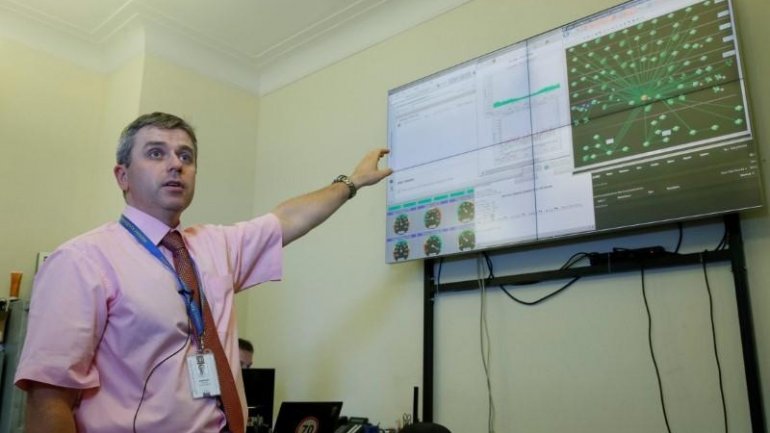Ukraine finally battens down its leaky cyber hatches after attacks
 foto: Roman Borodin, the head of the IT department of the Ukrainian Presidential Administration, points to a monitor showing activity on the network, during an interview with Reuters in Kiev, Ukraine July 26, 2017./Reuters
foto: Roman Borodin, the head of the IT department of the Ukrainian Presidential Administration, points to a monitor showing activity on the network, during an interview with Reuters in Kiev, Ukraine July 26, 2017./Reuters
When the chief of Microsoft Ukraine switched jobs to work for President Petro Poroshenko, he found that everyone in the office used the same login password. It wasn't the only symptom of lax IT security in a country suffering crippling cyber attacks.
Sometimes pressing the spacebar was enough to open a PC, according to Dmytro Shymkiv, who became Deputy Head of the Presidential Administration with a reform brief in 2014.
Today discipline is far tighter in the president's office. But Ukraine - regarded by some, despite Kremlin denials, as a guinea pig for Russian state-sponsored hacks - is fighting an uphill battle in turning pockets of protection into a national strategy to keep state institutions and systemic companies safe.
As in many aspects of Ukrainian life, corruption is a problem. Most computers run on pirated software, and even when licensed programs are used, they can be years out of date and lack security patches to help keep the hackers at bay.
Three years into the job, Shymkiv is leading the fight back. He has put together a team, led by a former Microsoft colleague, doing drills, sending out email bulletins to educate staff on new viruses and doing practice hacks offsite.
Bruised by past experiences, Ukraine is protecting itself better.
Finance Minister Oleksandr Danylyuk told Reuters his ministry overhauled security after a hack in November crashed 90 percent of its network at the height of budget preparations.
Officials couldn't log into the system that manages budget transactions for 48 hours, something that played on Danylyuk's mind as he addressed the Verkhovna Rada or parliament.
"I understood that if I showed even the slightest hint of our nervousness, the organizers of the attack would achieve their goal."
Consultants uncovered familiar weaknesses: the budget system operated on a platform dating from 2000, and the version of the database management system should have been upgraded in 2006.
The ministry emerged unscathed from the June 27 attack. Others weren't so lucky: Deputy Prime Minister Pavlo Rozenko tweeted a picture of a crashed computer in the cabinet office that same day.
Ukraine is also benefiting from help from abroad.
A cyber police force was set up in 2015 with British funding and training in a project coordinated by the Organization for Security and Co-operation in Europe (OSCE).
While Ukraine is not a NATO member, the Western alliance supplied equipment to help piece together who was behind the June attack and is helping the army set up a cyber defense unit.
Ukraine shares intelligence with neighboring Moldova, another ex-Soviet state that has antagonized Moscow by moving closer to the West and complains of persistent Russian cyber attacks on its institutions.
Read more Reuters

